Contents
- 1 1st Jawaharlal Nehru Speech (20 min)
- 2 2nd Jawaharlal Nehru Speech (15 min)
- 3 3rd Jawaharlal Nehru Speech (10 min)
- 4 4th Jawaharlal Nehru Speech (5 min)
- 5 5th Jawaharlal Nehru Speech (3 min)
- 6 FAQs related to Jawaharlal Nehru
- 6.1 Who was Jawaharlal Nehru?
- 6.2 What was Jawaharlal Nehru’s role in India’s independence movement?
- 6.3 What were some of Nehru’s major accomplishments as Prime Minister?
- 6.4 What was Nehru’s vision for India?
- 6.5 What were some of the challenges Nehru faced during his tenure as Prime Minister?
- 6.6 What was Nehru’s legacy?
- 6.7 Why is it important to learn about Jawaharlal Nehru?
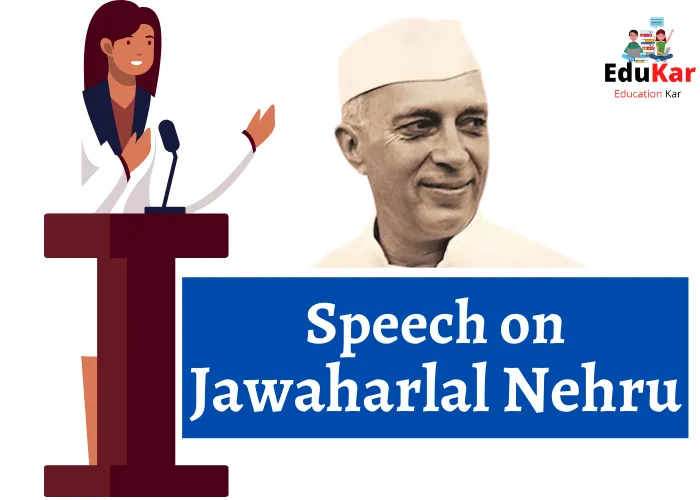
Looking for an inspiring and informative speech on Jawaharlal Nehru? Our collection of 5 Best speeches on Jawahar Lal Nehru will highlight the life, accomplishments, and legacy of Jawaharlal Nehru. From his role in the Indian independence movement to his contributions as India’s first Prime Minister, you’ll gain a deeper understanding of Nehru’s impact on Indian history and the world. So, get ready to be captivated by this insightful and thought-provoking speech on one of India’s greatest leaders!
1st Jawaharlal Nehru Speech (20 min)

Honorable guests, ladies, and gentlemen,
Today, I stand before you to speak about one of India’s most iconic leaders, Jawaharlal Nehru. Born on November 14, 1889, in Allahabad, India, Nehru was an passionate nationalist, and a champion of the Indian independence movement.
Nehru’s family was part of the Indian elite, and he was educated in England, where he was exposed to Western ideas and values. After returning to India, he became involved in the Indian National Congress, which was the leading political party in the struggle for Indian independence from British colonial rule.
Nehru served as the first Prime Minister of India from 1947 until his death in 1964. During his tenure, he played a critical role in shaping India’s political and economic future. He implemented several policies aimed at transforming India from an agrarian society to an industrialized one.
Nehru’s policies were informed by his belief in democracy, secularism, and socialism. He believed that India’s diversity was its strength and sought to promote unity and harmony among the country’s different religious and ethnic groups.
One of Nehru’s most significant contributions was his role in India’s independence movement. He was one of the key leaders who fought against British colonialism, and his vision of a free, democratic, and secular India inspired millions of people to join the movement.
After India gained independence in 1947, Nehru faced numerous challenges as he sought to transform the country. He established a democratic system of government, laying the foundations of a vibrant and robust democracy that still endures today.
Nehru also implemented policies aimed at promoting economic growth and development. He established a mixed economy, where the state played a central role in economic planning and development. This led to the growth of key industries such as steel, energy, and infrastructure.
Furthermore, Nehru was a committed advocate of education and literacy. He believed that education was the key to the country’s progress and prosperity. He established a network of universities and schools, and his government launched several programs aimed at promoting literacy and providing education to all.
Nehru’s contributions to India’s development were not limited to domestic policies. He played an active role in international affairs, advocating for peace and cooperation among nations. He was one of the founding members of the Non-Aligned Movement, a group of countries that sought to maintain neutrality in the Cold War and promote cooperation among developing nations.
However, Nehru’s legacy is not without its controversies. Some have criticized him for his policies, particularly in the area of economic development. His government’s focus on heavy industry and central planning led to inefficiencies and economic stagnation.
Additionally, Nehru’s approach to foreign policy, particularly in relation to India’s relationship with China, has been the subject of much debate. Some argue that Nehru’s handling of the border dispute with China led to a war that India was ill-prepared for.
Despite these criticisms, Nehru remains one of India’s most beloved and respected leaders. His contributions to India’s independence, democracy, and development are unparalleled, and his vision of a secular, democratic, and united India continues to inspire generations of Indians.
At the end the end, Jawaharlal Nehru was a visionary leader, who played a critical role in shaping modern India. His commitment to democracy, secularism, and socialism, his contributions to India’s independence, and his efforts to promote economic growth and development, education, and international cooperation are his enduring legacies.
Thank you.
Also Read: Bhagat Singh Speech
2nd Jawaharlal Nehru Speech (15 min)
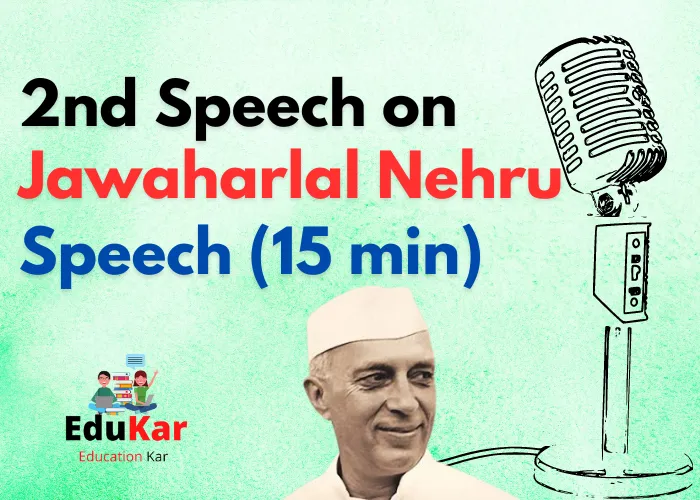
Dear friends and fellow citizens,
Today, I would like to talk about one of the most prominent figures in Indian history – Jawaharlal Nehru. He was the first Prime Minister of independent India and a towering leader who played a crucial role in shaping the country’s destiny.
Born in Allahabad on November 14, 1889, Nehru was the eldest son of Motilal Nehru, a prominent lawyer and politician. From a young age, he was exposed to a liberal and intellectual environment, which instilled in him a deep sense of social justice and a commitment to public service.
After completing his education in England, Nehru returned to India and became actively involved in the country’s freedom struggle. He was deeply influenced by Mahatma Gandhi’s philosophy of non-violent resistance and played a key role in organizing the Indian National Congress’s mass movements against British colonial rule.
In 1947, when India finally achieved independence, Nehru became the country’s first Prime Minister. He inherited a nation that was torn apart by communal violence and faced enormous challenges, including poverty, illiteracy, and the need to establish a democratic and secular society.
Nehru was a visionary leader who believed in the power of education, science, and technology to transform India into a modern, prosperous, and egalitarian society. He set up a number of institutions of higher learning, including the Indian Institutes of Technology and the Indian Institutes of Management, and promoted scientific research and technological innovation.
He also initiated a number of social and economic reforms aimed at empowering the marginalized sections of society, including the landless peasants, tribal communities, and women. He championed the cause of universal education, healthcare, and basic amenities like water and electricity, which were seen as essential to the country’s progress.
Nehru’s foreign policy was guided by the principles of non-alignment and peaceful co-existence. He believed in building strong ties with other countries, both within and outside the region, based on mutual respect and cooperation. He was a vocal advocate of disarmament and nuclear disarmament, and played a leading role in the formation of the Non-Aligned Movement, which sought to provide an alternative to the Cold War superpowers.
Nehru was also a fertile writer. His speeches and writings reflected his broad vision, his commitment to democracy, and his deep concern for the welfare of the people. Some of his famous books include “The Discovery of India” and “Glimpses of World History,” which are still widely read and admired.
Despite his many achievements, Nehru’s tenure as Prime Minister was not without its share of challenges and controversies. The country faced a number of crises, including the war with China in 1962 and the Indo-Pakistani war of 1965. He was also criticized for his handling of the Kashmir issue, which remains unresolved to this day.
Nehru’s death in 1964 was a great loss to the nation. He left behind a legacy of leadership, vision, and commitment that continues to inspire us to this day. His contributions to the country’s progress and development are immense, and his legacy will continue to inspire generations to come.
In the end, Jawaharlal Nehru was a towering figure in Indian history, whose leadership and vision played a crucial role in shaping the country’s destiny. He was a committed democrat, a social reformer, and a visionary who believed in the power of education, science, and technology to transform India into a modern, prosperous, and egalitarian society. His legacy continues to inspire us today, and his ideas and ideals remain as relevant as ever.
Thank you.
3rd Jawaharlal Nehru Speech (10 min)
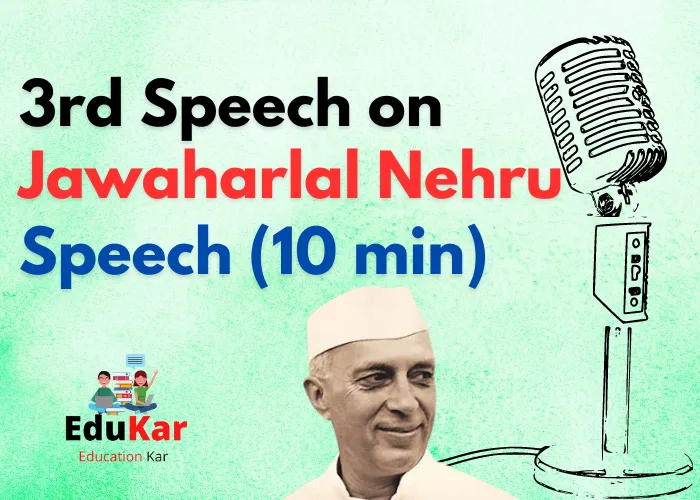
Good Morning/Afternoon/Evening Honorable guests, ladies, and gentlemen,
Today, I would like to talk about one of the most influential and beloved figures in Indian history, Jawaharlal Nehru.
Jawaharlal Nehru was born on November 14, 1889, in Allahabad, India. He was the son of a wealthy lawyer and politician, Motilal Nehru. Nehru was educated in England, where he studied at Harrow School and Trinity College, Cambridge. He was admitted to the bar in 1912 and returned to India to practice law.
Nehru was drawn into the Indian independence movement in his early years. He joined the Indian National Congress in 1919, and by 1929 he had become one of its most prominent leaders. Nehru was a proponent of non-violent resistance, which was championed by Mahatma Gandhi, and he played a key role in organizing the Salt March in 1930.
Nehru was imprisoned several times during his political career. He was imprisoned for the Salt Satyagraha in 1930, for the Quit India movement in 1942, and for participating in a civil disobedience campaign in 1947.
Nehru played an important role in the negotiations for Indian independence. He served as India’s first Prime Minister from 1947 until his death in 1964. Nehru was a socialist and believed in economic planning and social justice. He implemented a series of policies to modernize India, including the establishment of large-scale industries, the creation of a nationalized banking system, and the expansion of the country’s infrastructure.
One of Nehru’s most enduring legacies is the Non-Aligned Movement. Nehru was one of the founders of the movement, which sought to create a group of nations that were not aligned with either the United States or the Soviet Union during the Cold War. The movement was founded in 1961, and it included countries from Asia, Africa, and Latin America.
Nehru was also a champion of democracy and human rights. He believed that democracy was essential for the success of India and worked to ensure that the country remained a democratic republic. Nehru was also a champion of women’s rights and worked to improve the status of women in Indian society.
Nehru was an accomplished writer and scholar. He wrote several books, including “The Discovery of India” and “Glimpses of World History.” Nehru was also a gifted speaker and delivered several famous speeches, including his “Tryst with Destiny” speech on the eve of Indian independence.
Nehru’s impact on Indian history cannot be overstated. He played a key role in the country’s struggle for independence and worked tirelessly to create a modern, democratic, and just society. His legacy lives on in India today, and he remains one of the country’s most beloved and respected figures.
Finally, Jawaharlal Nehru was a remarkable figure who shaped the course of Indian history. His contributions to the Indian independence movement, his leadership as India’s first Prime Minister, and his dedication to democracy, social justice, and human rights have left an indelible mark on Indian society. As we remember Nehru today, we should strive to uphold his ideals and continue to work towards creating a better, more equitable world for all people.
Thank you.
Also Read: APJ Abdul Kalam Speech
4th Jawaharlal Nehru Speech (5 min)
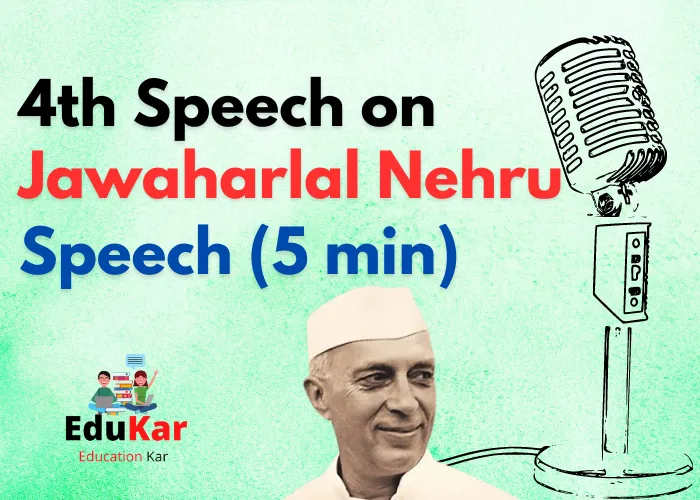
Good Morning/Afternoon/Evening Honorable guests, ladies, and gentlemen,
Today, I stand before you to speak about one of the most prominent figures in Indian history – Jawaharlal Nehru. Nehru was a visionary leader who played a pivotal role in shaping the modern India we know today. He was the first Prime Minister of India, serving from 1947 until his death in 1964.
Born on November 14, 1889, in Allahabad, Uttar Pradesh, Nehru came from a prominent family. His father, Motilal Nehru, was a wealthy barrister and a prominent leader in the Indian National Congress. Nehru was educated in England at Harrow and Cambridge before returning to India to practice law. However, he soon became involved in politics, joining the Indian National Congress in 1919.
Nehru’s leadership during India’s struggle for independence was marked by his ability to deploy the mass number of people and inspire them to take part in the freedom struggle. He was an excellent orator, and his speeches were known for their eloquence and passion. Nehru was a staunch believer in non-violent resistance, and he encouraged people to protest peacefully.
After India gained independence in 1947, Nehru became the first Prime Minister of the country. He faced many challenges, including the partition of India, which resulted in the creation of Pakistan. Nehru was committed to ensuring that India remained a united, secular country, and he worked hard to promote communal harmony.
Under Nehru’s leadership, India began a program of modernization and development. He believed that India needed to industrialize quickly to catch up with the developed nations of the world. Nehru introduced a series of economic and social reforms, including land reforms, the establishment of public sector enterprises, and the promotion of scientific research and education.
Nehru was also a strong advocate of nuclear disarmament and world peace. He played an important role in the formation of the Non-Aligned Movement, which sought to maintain a neutral position in the Cold War between the United States and the Soviet Union.
Nehru’s contributions to India and the world were many. He was a true patriot who dedicated his life to the service of his country. His vision of a democratic, secular, and socialist India remains relevant even today.
In th end, Jawaharlal Nehru was a remarkable leader who played a crucial role in shaping modern India. His vision of a united, democratic, secular, and socialist India continues to inspire us today. His commitment to peace, justice, and progress will always be remembered as a shining example of leadership for generations to come.
Thank you.
5th Jawaharlal Nehru Speech (3 min)
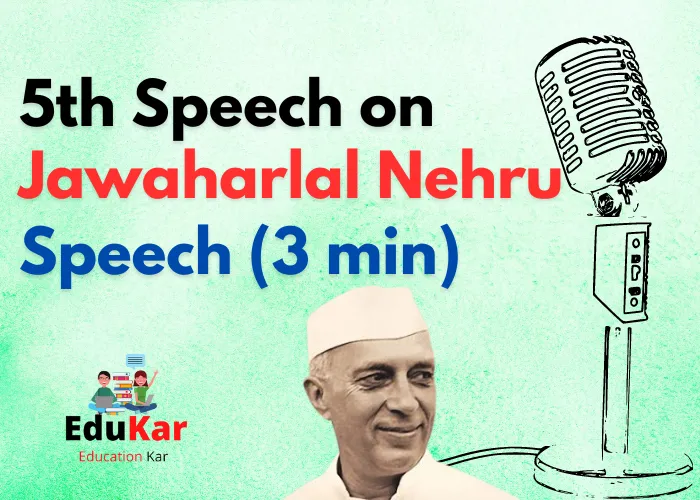
Dear fellow citizens,
Today, I would like to talk to you about one of the most significant figures in the history of India – Jawaharlal Nehru. He was an exceptional leader, an influential politician, and a freedom fighter who devoted his entire life to serve the nation.
Jawaharlal Nehru was born on November 14, 1889, in Allahabad, India. He came from a family of prominent lawyers and was educated in some of the finest institutions in India and the United Kingdom. Nehru was a visionary leader and a great orator who had a strong belief in democracy, secularism, and socialism.
In 1929, Nehru became the President of the Indian National Congress, and he played a crucial role in the fight for India’s independence from British rule. Nehru, along with other prominent leaders like Mahatma Gandhi and Sardar Patel, worked tirelessly to gain freedom for India, which was finally achieved on August 15, 1947.
After India gained independence, Nehru became the first Prime Minister of India, and he held this position until his death in 1964. Nehru’s tenure as Prime Minister was marked by a focus on economic development, social welfare, and modernization of the country. He initiated several policies to promote industrialization, agriculture, and education, which helped India to achieve significant progress in these areas.
Nehru was also a strong advocate of non-alignment in foreign policy, which helped India to maintain its independence and sovereignty. He played an active role in the formation of the Non-Aligned Movement, which gave voice to developing nations and helped to reduce global tensions during the Cold War era.
Nehru was not only a great politician but also a prolific writer. He authored several books, including the famous “Discovery of India,” which is regarded as one of the most comprehensive books on Indian history, culture, and philosophy.
Nehru was deeply committed to promoting communal harmony and social justice. He believed that a country can only progress if all its citizens are treated equally and have access to education and opportunities. Nehru was a strong advocate of secularism and believed that religion should not be used as a tool to divide people.
At the end, Jawaharlal Nehru was a true patriot, a visionary leader, and a great human being. He dedicated his entire life to the service of the nation and worked tirelessly to make India a better place. His legacy continues to inspire generations of Indians, and his contribution to the freedom struggle and the building of modern India will always be remembered.
Thank You.
Who was Jawaharlal Nehru?
Jawaharlal Nehru was the first Prime Minister of India, serving from 1947 until 1964.
What was Jawaharlal Nehru’s role in India’s independence movement?
Nehru was one of the key leaders of India’s independence movement, working closely with Mahatma Gandhi and other leaders to push for India’s independence from British rule.
What were some of Nehru’s major accomplishments as Prime Minister?
Nehru played a crucial role in modernizing India’s economy and infrastructure, and he championed a non-aligned foreign policy that helped establish India as a major player on the world stage. He also introduced a number of social welfare programs aimed at reducing poverty and inequality.
What was Nehru’s vision for India?
Nehru envisioned India as a secular, socialist, and democratic republic, with a strong emphasis on education, science, and technology.
What were some of the challenges Nehru faced during his tenure as Prime Minister?
Nehru faced a number of challenges, including regional conflicts, economic struggles, and tensions with neighboring countries like China and Pakistan.
What was Nehru’s legacy?
Nehru is widely regarded as one of India’s greatest leaders, and his legacy includes his contributions to India’s independence movement, his role in modernizing the country, and his efforts to establish India as a major player on the world stage.
Why is it important to learn about Jawaharlal Nehru?
Nehru’s legacy has had a profound impact on India and the world, and learning about his life and achievements can help us understand the history and culture of India, as well as the challenges and opportunities facing developing countries today.

![Speech on Lal Bahadur Shastri [Short & Long] Speech-on-Lal-Bahadur-Shastri-](https://edukar.in/wp-content/uploads/2023/03/Speech-on-Lal-Bahadur-Shastri-.webp)
![5 Best Speech on Bhagat Singh [Short & Long] Bhagat Singh Speech](https://edukar.in/wp-content/uploads/2023/03/Bhagat-Singh-Speech.webp)
![5 Best Speech on Shivaji Maharaj [Short & Long] Speech on Shivaji Maharaj](https://edukar.in/wp-content/uploads/2023/03/Speech-on-Shivaji-Maharaj.webp)
![5 Best Speech on APJ Abdul Kalam [Short & Long] APJ Abdul Kalam Speech](https://edukar.in/wp-content/uploads/2023/03/APJ-Abdul-Kalam-Speech.webp)
![Speech on Mahatma Gandhi [Short & Long] Speech on Mahatma Gandhi](https://edukar.in/wp-content/uploads/2023/03/Speech-on-Mahatma-Gandhi.webp)
![Speech On Swami Vivekananda [Short & Long] Speech On Swami Vivekananda](https://edukar.in/wp-content/uploads/2023/03/Speech-On-Swami-Vivekananda.webp)
![5 Best Global Warming Speech [Short & Long] Global Warming Speech](https://edukar.in/wp-content/uploads/2023/03/Global-Warming-Speech.webp)
![Speech about Nature [Short & Long] Speech about Nature](https://edukar.in/wp-content/uploads/2023/03/Speech-about-Nature.webp)
![5 Best Speech on Clean India [Short & Long] Speech on Clean India](https://edukar.in/wp-content/uploads/2023/03/Speech-on-Clean-India.webp)

![Speech on Success [Short & Long] Speech on Success](https://edukar.in/wp-content/uploads/2023/03/Speech-on-Success.webp)
![5 Best Speech on Air Pollution [Short & Long] Speech on Air Pollution](https://edukar.in/wp-content/uploads/2023/03/Speech-on-Air-Pollution.webp)



